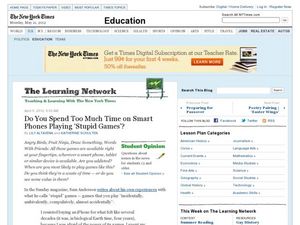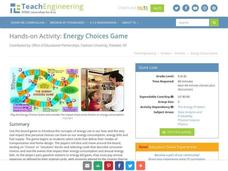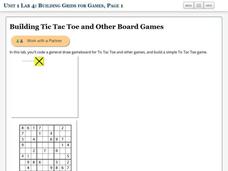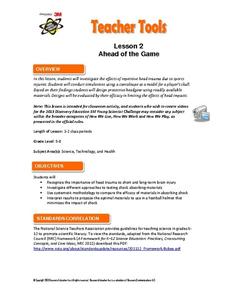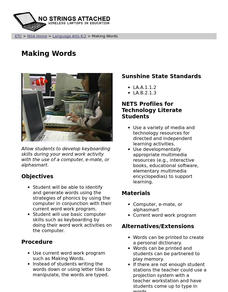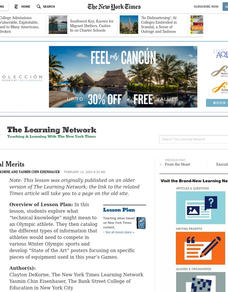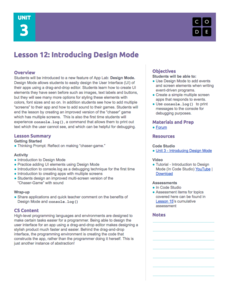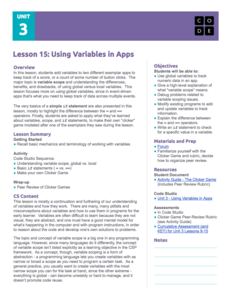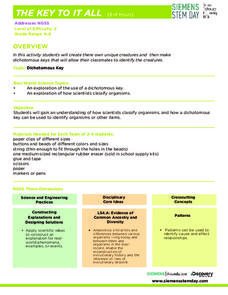Curated OER
Student Opinion: Do You Spend Too Much Time on Smart Phones Playing 'Stupid Games'?
This versatile resource from The New York Times website provides a short opinion piece on smart phones and the amount of time we spend playing games on them as well as several possible writing prompts pupils could consider in response to...
Teach Engineering
Energy Choices Game
Here's a fun game on a very serious matter. Scholars play a board game to learn about personal energy use and consumption. They see how various choices affect their energy use and costs, and then apply this knowledge to brainstorm ways...
Beauty and Joy of Computing
Building Grids for Games
You can't play Tic Tac Toe without grids. In the fourth lab of a five-part unit, scholars learn how to build grids for games such as Tic Tac Toe. Along the way, they also learn about reporter blocks that perform calculations.
Curated OER
Making Choices
Second graders explore financial decision making. In this introductory economics lesson, 2nd graders listen to the book Alexander, Who Used to be Rich Last Sunday by Judith Viorst, and discuss making financial choices based on wants and...
Discovery Education
Ahead of the Game
According to the movie Wildcats, "It's the sport of kings, better than diamond rings, football!" It is also, however, the sport of severe concussions and ongoing blows to the head. In order to keep our Seahawks soaring and Broncos...
Curated OER
Making Words
Young writers identify and generate words using the strategies of phonics on the Making Words computer program. Words are typed instead of having to use tiles or paper. Extension activities such as playing the memory game, drawing...
Code.org
Star Wars: Building a Galaxy with Code
Welcome to the code side. The interactive lesson plan introduces coding in a game format with familiar characters. Young computer experts learn to develop code to control the interaction of the characters in the game. The activity ends...
Curated OER
The Stock Market Game
Learners participate in a variety of stock market games within their classmates. They study the concepts of stocks and investments as well as the criteria for selecting of stocks. Each student is shown how to keep track of the progress...
Computer Science Unplugged
Battleships—Searching Algorithms
How does a computer perform a search in order to find data? The lesson begins with a demonstration on finding one number out of 15. Pairs then play three games of Battleship by using different search techniques. The lesson...
Purdue University
Recycling Paper
Build an appreciation for the green movement by recycling your own paper! Learners participate in a STEM instructional activity by learning about the process of recycling paper and then designing their own models. Their ultimate task is...
Discovery Education
The Everyday Science of Sports
Physical science juniors will enjoy this sensational enrichment on aerodynamics, especially if they are also sports fans! With a focus on physical features and behaviors, collaborative groups make observations on five different golf...
Curated OER
Making Good Money Choices
Students determine how to spend donated money. For this money choices lesson, students explore the needs of the community. They determine the best use of donated funds for a good cause or charity. Students play a bingo game to reinforce...
Curated OER
Technical Merits
What is technical knowledge? The class explores what technical knowledge might mean to an Olympic athlete. They catalog the different types of information that athletes would need to compete in various Winter Olympic sports and develop...
Hopscotch Technologies
Daisy the Dinosaur
Have you ever wanted to tell a tyrannosuarus rex what to do? Here's your chance! Introduce youngsters to the world of computer programming with an easy and adorable game in which a dinosaur follows your every command.
Code.org
Introducing Design Mode
Move beyond buttons when designing user interfaces. In the fourth installment of a 21-part unit, young computer scientists learn to apply design mode, which gives users options for colors, fonts, etc. They learn to incorporate these...
Code.org
Using Variables in Apps
Investigate the benefits of using global variables. The seventh installment of a 21-part unit continues the study of variables from the previous lesson plan. Young computer scientists modify two existing apps by adding variables and...
Sprite Box
Lightbot Jr 4 Coding Puzzles
Learning how to write computer code has never been so much fun! Given control of their very own robots, children create simple programs in order to solve a series of challenges and develop their problem solving skills.
Teach Engineering
Engineering and the Periodic Table
Elements, to the rescue! Scholars first review the periodic table, and then learn about the first 20 elements and their properties and uses in the fourth of six lessons in the Mixtures and Solutions unit. Applying their newfound...
Purdue University
Design of a Door Alarm
How does electricity work? Budding scientists explore the concepts of electrical currents and open and closed circuits with class discussion and a hands-on activity using a battery to turn on a light bulb. Learners also make predictions...
Discovery Education
The Key to It All
Which characteristics make organisms unique? Dichotomous keys simplify the process of classifying organisms by focusing on these unique characteristics. Young scholars learn how to use the dichotomous key flow chart by creating their own...
Teach Engineering
Coordinates and the Cartesian Plane
The plot thickens to get a functional understanding. After a short review of plotting points on the coordinate plane, class members learn the difference between functions and relations in the second lesson in a series of nine. They...
Curated OER
Technology that Makes Phonics Fun
Students discover the Internet by participating in on-line educational activities. In this educational technology lesson, students utilize interactive story books, podcasts, and games to help expand an understanding of phonics....
Curated OER
Jeopardy Game
Pupils review terms and concepts related to the class through games. They play a jeopardy style game to review concepts realted to the class.
Museum of Science
Balloon Racers
Watch those balloon cars go! Scholars build racers that run using the power of balloons and conduct races with the cars. They learn about Newton's third law of motion and how it applies to their balloon racers.
